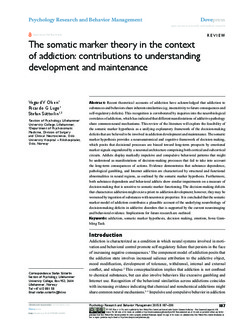| dc.contributor.author | Olsen, Vegard V. | |
| dc.contributor.author | Lugo, Ricardo G. | |
| dc.contributor.author | Sütterlin, Stefan | |
| dc.date.accessioned | 2016-01-14T11:58:52Z | |
| dc.date.available | 2016-01-14T11:58:52Z | |
| dc.date.issued | 2015 | |
| dc.identifier.uri | http://hdl.handle.net/11250/2373772 | |
| dc.description.abstract | Recent theoretical accounts of addiction have acknowledged that addiction to
substances and behaviors share inherent similarities (eg, insensitivity to future consequences and
self-regulatory deficits). This recognition is corroborated by inquiries into the neurobiological
correlates of addiction, which has indicated that different manifestations of addictive pathology
share common neural mechanisms. This review of the literature will explore the feasibility of
the somatic marker hypothesis as a unifying explanatory framework of the decision-making
deficits that are believed to be involved in addiction development and maintenance. The somatic
marker hypothesis provides a neuroanatomical and cognitive framework of decision making,
which posits that decisional processes are biased toward long-term prospects by emotional
marker signals engendered by a neuronal architecture comprising both cortical and subcortical
circuits. Addicts display markedly impulsive and compulsive behavioral patterns that might
be understood as manifestations of decision-making processes that fail to take into account
the long-term consequences of actions. Evidence demonstrates that substance dependence,
pathological gambling, and Internet addiction are characterized by structural and functional
abnormalities in neural regions, as outlined by the somatic marker hypothesis. Furthermore,
both substance dependents and behavioral addicts show similar impairments on a measure of
decision making that is sensitive to somatic marker functioning. The decision-making deficits
that characterize addiction might exist a priori to addiction development; however, they may be
worsened by ingestion of substances with neurotoxic properties. It is concluded that the somatic
marker model of addiction contributes a plausible account of the underlying neurobiology of
decision-making deficits in addictive disorders that is supported by the current neuroimaging
and behavioral evidence. Implications for future research are outlined. | nb_NO |
| dc.language.iso | eng | nb_NO |
| dc.rights | Navngivelse 3.0 Norge | * |
| dc.rights.uri | http://creativecommons.org/licenses/by-nc/3.0/no/ | * |
| dc.title | The somatic marker theory in the context of addiction: contributions to understanding development and maintenance | nb_NO |
| dc.type | Peer reviewed | nb_NO |
| dc.type | Journal article | |
| dc.subject.nsi | VDP::Social science: 200::Psychology: 260 | nb_NO |
| dc.source.pagenumber | 187–200 | nb_NO |
| dc.source.volume | 2015 | nb_NO |
| dc.source.journal | Psychology Research and Behavior Management | nb_NO |
| dc.source.issue | 8 | nb_NO |
| dc.identifier.doi | http://dx.doi.org/10.2147/PRBM.S68695 | |

